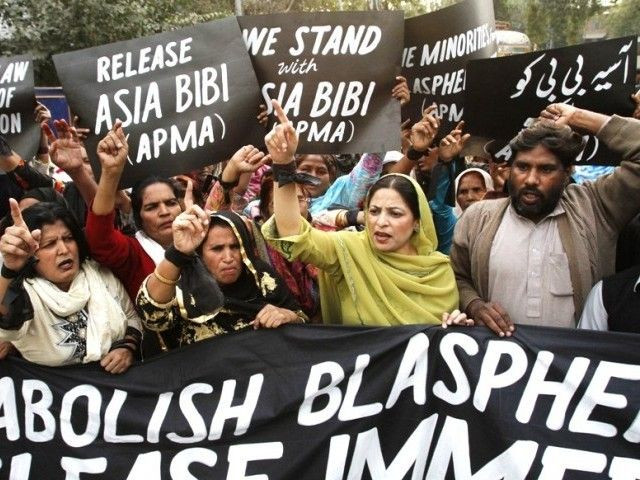The Problem Of Pakistan
Opinion

The troubling travails of Rimsha Masih, a Christian teenager who lives near Islamabad and is facing blasphemy charges for allegedly burning pages of the Koran to cook, reflects the growing intolerance toward religious minorities that amounts to what one expert calls a “gradual genocide” in Pakistan.
The latest twist in this sordid tale came this week as three witnesses who had told police that a Muslim cleric planted the evidence that led to the charges against Masih recanted their statements at a bail hearing.
Masih’s case, while disturbing on its own, is part of a troubling reality that the United States confronts as it seeks a better working relationship with this key nation -- for Pakistan is all of the following:
- -- A supposed ally that continues to harbor and empower terrorists who are killing U.S. soldiers in Afghanistan;
- -- A regional power with nuclear weapons that we think are secure -- but about which we worry due to the military’s deep ties to terrorist groups; and
- -- A human rights abuser that’s somewhat impervious to pressure due to its nuclear arsenal and to our need for its cooperation in hunting the terrorists who enjoy safe haven in its country.
Pakistan is perhaps the best current example of where our deep-seated values and long-term hopes for a freer, more democratic world run head-first into our short-term national security needs.
We seek to advance freedom and democracy around the world because a freer, more democratic world -- in which more people can choose their government and pursue their dreams -- will be a safer, more prosperous one for us at home.
But, from time to time, we put that vision on the back burner due to our short-term interests of national security, regional stability, or access to natural resources -- and nowhere have we done that more so of late than with Pakistan.
In a paper about Pakistan’s “gradual genocide” of its minorities, Tufail Ahmad, who directs the Middle East Media Research Institute’s South Asia Studies Project, wrote:
“In recent years, anyone who is not a Muslim in Pakistani society – or groups of Muslims who are not considered to be Muslim socially and religiously or under Pakistan’s law – have been facing a sustained campaign of hate and religious persecution by Islamic groups and individual, including government officials, legislators, judges, lawyers, police officers and clerics, who interpret the law on their own terms and enforce it with the objective of making Pakistan a purer-than-ever Islamic nation.
“The persecution is manifested,” Ahmad continued, “in the imprisonment of Christians and Ahmadi Muslims on charges of blasphemy; abduction of Hindu and Christian girls and their forced conversion to Islam; demolition and desecration of houses of worship; denial of food relief to non-Muslim flood victims by both government officials and wealthy philanthropists; denigration of and attacks on Shi'ite Muslims -- and the deliberate and systematic killing of members of all these communities.”
The persecution of Christians includes the kidnapping of pastors and other known Christians, forced conversions to Islam of eight to 10 Christians a month in the Sindh and Punjab provinces, the poisoning of nine Christian trainee nurses in Karachi in July, attacks on churches and other Christian property, and the targeted murder of Christians who hold public office.
The persecution of Hindus and Sikhs includes the forced payment of a poll tax by non-Muslims, calls by Islamic leaders for jihad against Sikhs, abductions and forced conversions to Islam of 20 to 25 Hindu girls each month, and denials of food aid to Hindu children by government officials and philanthropists.
The persecution of Muslims who are not considered Muslims “socially and religiously or under Pakistan’s law” includes targeted killings of Ahmadi Muslims, a religious group’s support for killing Ahmadis in the interest of jihad, the firing of Ahmadi teachers and expelling of Ahmadi students, the Pakistan Telecommunication Authority’s blocking of access to the Ahmadi community’s official website, targeted killings of Shi’ite Muslims, and Sunni Muslim clerics’ calls for prejudice and violence against Shi’ites.
From time to time, of course, U.S. officials shut their eyes to human rights abuses by a nation that’s helping us on vital and immediate matters, such as efforts to find and uproot terrorist networks.
Pakistan, though, is a particularly vexing problem because, while we seek its help to confront the terrorist safe havens in its midst, its government and military are notably ambivalent about the matter -- sometimes helping us, sometimes helping the terrorists that spill into Afghanistan and kill U.S. soldiers.
In a dramatic segment on CBS’s “60 Minutes” this week, correspondent Lara Logan had a painfully telling exchange with U.S. General John Allen, who heads the U.S. combat effort in Afghanistan.
Logan: “Your deadliest enemies on the Afghan battlefield have complete freedom of movement inside Pakistan with the blessing of the Pakistanis. And every commander that's sat in your shoes has had to try and build a relationship and go through the same motions time and time again and the effect on the battlefield remains exactly the same. American soldiers continue to die because of the support Pakistan gives to America's enemies.”
Allen: “You've just stated the truth.”
Here’s the broader truth: Pakistan is a nation that neither reflects our values nor shares our goals for the region.
Perhaps we should accept that cold reality -- and adjust our policies accordingly.
Lawrence J. Haas, former communications director for Vice President Al Gore, is a senior fellow at the American Foreign Policy Council and author of “Sound the Trumpet: The United States and Human Rights Promotion” (just out from Rowman & Littlefield).
© Copyright IBTimes 2025. All rights reserved.





















